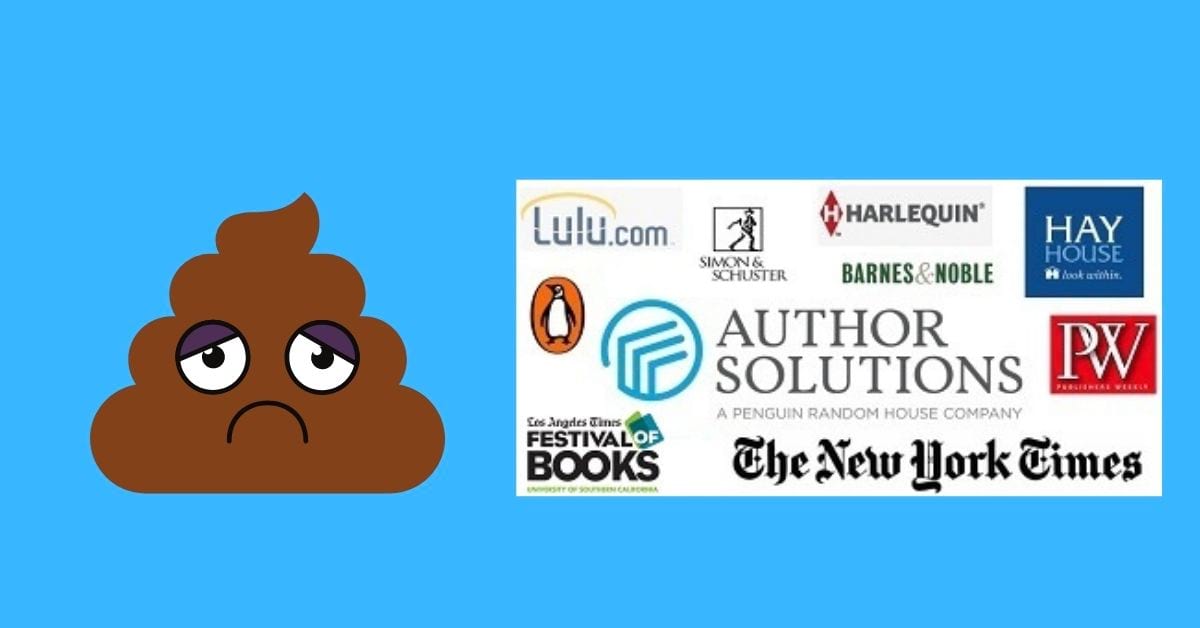
Vanity Press Victims and Media Culpability
Experienced authors tend to chastise vanity press victims for not doing sufficient research, but the murky web of vanity partnerships — and the uncritical coverage which invariably accompanies same — makes it exceedingly difficult for newer writers to chart a safe path.
Some vanity presses are very good at crafting a veneer of legitimacy, one which can be very convincing to those starting out. Infamous vanity press conglomerate Author Solutions figured this out very early on, creating partnerships with Penguin, Harlequin, Writer’s Digest, Random House, HarperCollins/Thomas Nelson, Hay House, Reader’s Digest, Lulu, and Barnes & Noble.
These partnerships served two purposes. First, they delivered an endless stream of victims directly from the companies themselves who would refer business to Author Solutions in return for a cut. Second, they helped Author Solutions whitewash its past, acting as a reputational fig leaf, hiding its seamy nature until it was too late. Read More…

Vanity Publishing Is At The Heart Of Our Industry
Scammers used to operate at the edges of the publishing business, but have wormed their way into its heart. And the entire industry is in denial. This post is from 9 August 2016. It has not been updated except to clean up broken links but the comments remain open. An unintentionally revealing aspect of the tiresome Amazon-Hachette dispute was a series of statements from an organization purporting to advocate for authors’ rights. One of the heinous crimes Amazon was said to have committed was treating books like toasters. With such a claim, Authors United was attempting to tap into a current of feeling about the commoditization of literature – as if Amazon was the first company to put a price Read More…

Publishing Is Rotten To The Core
Amazon is regularly slated for the way it manages its tax affairs. I have written extensively about this before, but, in short, Amazon is using common methods for minimizing its tax bills that are used by every major tech company, and many other multinational corporations too).
You can argue these loopholes should be closed (and I would agree, for what it’s worth), but these actions are legal. And I wouldn’t be surprised if the major publishers, and the global media conglomerates which own them, are doing the exact same thing.
Take Harlequin, for example. Harlequin doesn’t just use these corporate structures to minimize its tax bill. It has also used them to reduce the 50% digital royalty rate agreed in some of its initial ebook contracts to a paltry 3%. Harlequin is facing a class action suit because of this, but you won’t find coverage of that in the news media or outrage about Harlequin’s actions among publishing professionals. Read More…

The Type Of Competition Big Publishers Want
The real discoverability problem in publishing is that readers are discovering (and enjoying) books that don’t come from the large publishers. What these publishers have is a competition problem not a discoverability problem.
Amazon regularly gets slated for purported anti-competitive actions, but it has done more to create the digital marketplace than any other company. It has also done more to open up that marketplace to vendors of all shapes and sizes than any other company. Small publishers and self-publishers, for the very first time, have a level playing field with large publishers.
In other words, Amazon has fostered huge levels of competition that rarely get spoken about. Because Big Publishing doesn’t want actual competition. It hates actual competition. Read More…
Why Is The Media Ignoring Author Exploitation?
The Amazon-Hachette dispute has caught the media’s attention. But what about the story the media refuses to cover? The media is more concerned with one-sided accounts of Amazon’s perceived actions – when no one really knows the exact nature of the dispute. The media is more concerned with what Amazon might do in the future, than actual author exploitation by the world’s largest trade publisher: Penguin Random House. Penguin Random House owns the world’s largest vanity press – Author Solutions – which is currently subject to a class action for deceptive business practices, breach of contract, unjust enrichment, and violation of business statutes in California, New York, and Colorado. The court papers cover the same ground that I’ve been blogging about for the Read More…

The Real Scandal At LA Times Festival of Books Isn’t Amazon
This is the same LA Times Festival of Books that has been welcoming Author Solutions for years without a peep. And aside from scamming writers in general, Author Solutions has also been scamming authors at the event.
I reported last month that Author Solutions is selling $3,999 book signing packages to appear at the LA Times Festival of Books, and that by Author Solutions’ own figures, they screwed authors out of over $900,000 at last year’s event alone.
This book signing scam has been going on at the LA Times Festival of Books for at least five years. Where’s the outrage? It’s pretty hard to miss the giant row of Author Solutions booths at the event. Why didn’t all these indie booksellers and publishing professionals threaten a boycott over Author Solutions?
And why hasn’t Publishers Weekly covered this story? Read More…
^